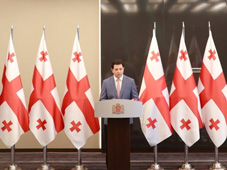
Members of the Parliament respond to package of electoral reforms
By Inga Kakulia
Wednesday, August 7
The Proposed plan for the electoral reforms has attracted a lot of attention from the Members of the Parliament. The members of the opposition are against some of the changes and are accusing the government in an attempt to gain more control over the election process.
One of the most controversial topics is the one concerning hate speech. According to the proposed reform the election program, as well as any other call/statement/action, should not include propaganda of war and violence, hate speech and xenophobic statements and the media will be under an obligation to check whether the campaign ad is in compliance with the new regulations and the requirements of the legislation regarding the hate speech.
Member of the European Georgia party, Otar Kakhadze said that hate speech amendments are troublesome and authorities may try to suppress critical opinions. “I think this issue is quite problematic since the definition of hate speech itself is not given. Freedom of expression can be severely restricted. Therefore, this is a dangerous record, and we believe that it should be left out or more clearly defined,” said Kakhidze.
The member of the United Nations Movement, Tina Bokuchava also shared her opinions on the reform proposal and said that there are a number of other issues in the proposed reform strategy that focuses on trying to limit somehow or hinder opposition activities, including a ban on election blocs. “The blocs have always been a driver of change in democratic Georgia. That’s why Ivanishvili wants to ban them. Regulations regarding election airtime and changes to election administration are problematic,” said Tina Bokuchava.
On the other hand, members of the ruling party see the clear need for these reforms, including the one concerning hate speech. The member of the parliamentary majority, Davit Matikashvili, brought up the example of previous parliamentary elections and said that the society was greatly concerned with hate speech during the election process.
“Freedom of speech and media is a priority, as well as creating a healthy environment in the electoral law We need to establish a regulation that, on the one hand, complies with the basic principles of freedom of speech and, on the other hand, regulates something that is of concern to our society. The discontent of the public during the previous elections was evident. There will be a regulation that will properly solve the problem,” said Matitashvili.
The member of the majority and the executive secretary of the Georgian Dream party, Irakli Kobakhidze also responded to the critics saying that the OSCE recommended these changes.
“The OSCE recommendations called for addressing hate speech and xenophobic issues and for imposing appropriate restrictions. This is reflected in the legislation in the mildest form possible. It is simply stated in the electoral law that if some propaganda material contains hate speech or xenophobia, it cannot be disseminated,” said Kobakhidze.
The proposed reforms also include a proportional system for holding the 2020 elections, changes in party funding rules, allocation of airtime between political parties, recruitment of central and lower-level election commissions as well as the oversight of election campaign financing.



